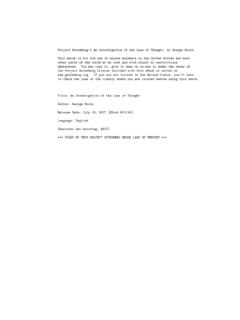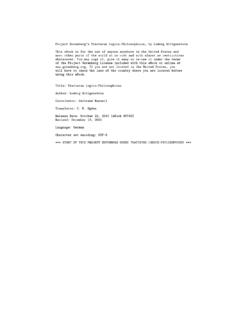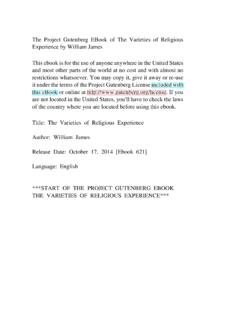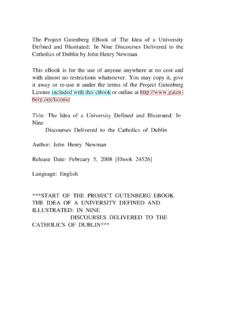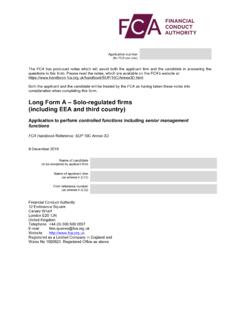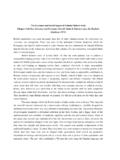Transcription of Principles Of Political Economy
1 The Project Gutenberg EBook of Principles Of Political Economyby John Stuart MillThis eBook is for the use of anyone anywhere at no costand with almost no restrictions whatsoever. You may copyit, give it away or re-use it under the terms of the ProjectGutenberg License included with this eBook or online : Principles Of Political EconomyAuthor: John Stuart MillRelease Date: September 27, 2009 [Ebook 30107]Language: English**START OF THE PROJECT GUTENBERG EBOOKPRINCIPLES OF Political Economy ** Principles Of Political EconomyByJohn Stuart MillAbridged, with Critical, Bibliographical,and Explanatory Notes, and a Sketchof the history of Political Economy ,ByJ.
2 Laurence Laughlin, Ph. Professor of Political Economy in HarvardUniversityA Text-Book For York:D. Appleton And Company,1, 3, and 5 Bond .. 2 Introductory.. 7A Sketch Of The history Of Political Economy .. 7 Books For Consultation (From English, French, AndGerman Authors).. 53 Preliminary Remarks.. 57 Book I. Production.. 62 Chapter I. Of The Requisites Of Production.. 62 1. The requisites of production.. 62 2. The Second Requisite of Production, Labor.. 64 3. Of Capital as a Requisite of Production.. 67 Chapter II. Of Unproductive Labor.. 70 1. Definition of Productive and UnproductiveLabor.. 70 2.
3 Productive and Unproductive Consumption.. 71 3. Distinction Between Labor for the Supply ofProductive Consumption and Labor forthe Supply of Unproductive Consumption. 72 Chapter III. Of Capital.. 75 1. Capital is Wealth Appropriated to Repro-ductive Employment.. 75 2. More Capital Devoted to Production thanActually Employed in it.. 78 3. Examination of Cases Illustrative of the Ideaof Capital.. 81 Chapter IV. Fundamental Propositions RespectingCapital.. 85 1. Industry is Limited by Capital.. 85ivPrinciples Of Political Economy 2. Increase of Capital gives Increased Em-ployment to Labor, Without AssignableBounds.
4 86 3. Capital is the result of Saving, and all Capitalis Consumed.. 90 4. Capital is kept up by Perpetual Reproduction,as shown by the Recovery of Countriesfrom Devastation.. 93 5. Effects of Defraying Government Expendi-ture by Loans.. 96 6. Demand for Commodities is not Demandfor Labor.. 100 Chapter V. On Circulating And Fixed Capital.. 108 1. Fixed and Circulating Capital.. 108 2. Increase of Fixed Capital, when, at theExpense of Circulating, might be Detri-mental to the Laborers.. 110 3. This seldom, if ever, occurs.. 112 Chapter VI. Of Causes Affecting The Efficiency OfProduction.. 115 1. General Causes of Superior Productiveness.
5 115 2. Combination and Division of Labor IncreaseProductiveness.. 117 3. Advantages of Division of Labor.. 120 4. Production on a Large and Production on aSmall Scale.. 125 Chapter VII. Of The Law Of The Increase Of Labor.. 130 1. The Law of the Increase of Produc-tion Depends on those of Three Ele-ments Labor. Capital, and Land.. 130 2. The Law of Population.. 130 3. By what Checks the Increase of Populationis Practically Limited.. 133 Chapter VIII. Of The Law Of The Increase Of Capital. 140v 1. Means for Saving in the Surplus aboveNecessaries.. 140 2. Motive for Saving in the Surplus aboveNecessaries.. 141 3.
6 Examples of Deficiency in the Strength ofthis Desire.. 144 4. Examples of Excess of this Desire.. 147 Chapter IX. Of The Law Of The Increase Of ProductionFrom Land.. 151 1. The Law of Production from the Soil, a Lawof Diminishing Return in Proportion tothe Increased Application of Labor andCapital.. 151 2. Antagonist Principle to the Law of Dimin-ishing Return; the Progress of Improve-ments in Production.. 155 3. In Railways.. 158 4. In Manufactures.. 162 5. Law Holds True of Mining.. 167 Chapter X. Consequences Of The Foregoing Laws.. 170 1. Remedies for Weakness of the Principle ofAccumulation.. 170 2. Even where the Desire to Accumulate isStrong, Population must be Kept withinthe Limits of Population from Land.
7 171 3. Necessity of Restraining Population notsuperseded by Free Trade in Food.. 175 4. Nor by Emigration.. 177 Book II. Distribution.. 182 Chapter I. Of Property.. 182 1. Individual Property and its opponents.. 182 2. The case for Communism against privateproperty presented.. 185 3. The Socialists who appeal to state-help.. 188viPrinciples Of Political Economy 4. Of various minor schemes, Communisticand Socialistic.. 194 5. The Socialist objections to the present orderof Society examined.. 197 6. Property in land different from property inMovables.. 200 Chapter II. Of Wages.. 204 1. Of Competition and Custom.
8 204 2. The Wages-fund, and the Objections to itConsidered.. 206 3. Examination of some popular Opinionsrespecting Wages.. 213 4. Certain rare Circumstances excepted, HighWages imply Restraints on Population.. 219 5. Due Restriction of Population the onlySafeguard of a Laboring-Class.. 221 Chapter III. Of Remedies For Low Wages.. 225 1. A Legal or Customary Minimum of Wages,with a Guarantee of Employment.. 225 2. Would Require as a Condition LegalMeasures for Repression of Population.. 228 3. Allowances in Aid of Wages and theStandard of Living.. 231 4. Grounds for Expecting Improvement in Pub-lic Opinion on the Subject of Population.
9 233 5. Twofold means of Elevating the Habits ofthe Laboring-People; by Education, andby Foreign and Home Colonization.. 235 Chapter IV. Of The Differences Of Wages In DifferentEmployments.. 238 1. Differences of Wages Arising from DifferentDegrees of Attractiveness in DifferentEmployments.. 238 2. Differences arising from Natural Monopolies. 241vii 3. Effect on Wages of the Competition ofPersons having other Means of Support.. 243 4. Wages of Women, why Lower than those ofMen.. 246 5. Differences of Wages Arising from Laws,Combinations, or Customs.. 248 Chapter V. Of Profits.. 250 1. Profits include Interest and Risk; but,correctly speaking, do not include Wagesof Superintendence.
10 250 2. The Minimum of Profits; what producesVariations in the Amount of Profits.. 253 3. General Tendency of Profits to an Equality.. 255 4. The Cause of the Existence of any Profit;the Advances of Capitalists consist ofWages of Labor.. 260 5. The Rate of Profit depends on the Cost ofLabor.. 262 Chapter VI. Of Rent.. 270 1. Rent the Effect of a Natural Monopoly.. 270 2. No Land can pay Rent except Land ofsuch Quality or Situation as exists in lessQuantity than the Demand.. 271 3. The Rent of Land is the Excess of its Returnabove the Return to the worst Land inCultivation.. 273 4. Or to the Capital employed in the leastadvantageous Circumstances.



